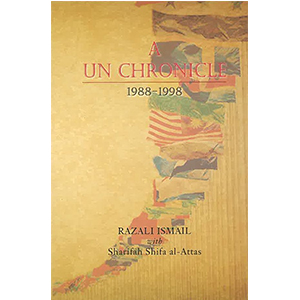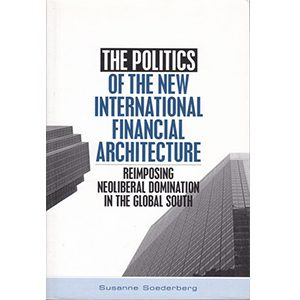A UN Chronicle, 1988-1998
Razali Ismail examines his years at the United Nations during a time when multilateral diplomacy struggled to find relevance towards the end of the Cold War and after. He writes about the interplay of diplomacy and international relations in the backdrop of the two Gulf wars, Bosnia and Palestine, and turmoil in certain parts of Africa. He has a chapter on his UN Myanmar assignment. Razali describes how Malaysia fought its diplomatic battles, a mix applying universal principals, the country’s interests and its emerging ethos. He does not avoid tackling well-known events in UN history like the story of Boutros Boutros-Ghali’s undoing as Secretary-General, where he provides new revelations into the goings-on, as well as describing in fresh detail aspects of leadership at the UN as reflected in his own presidency of both the Security Council, in 1989, and the General Assembly from 1996 to 1997. In so doing, Razali reveals both the role played by Malaysia on a number of key issues that emerged at that time as well as, and perhaps even more interesting, how the role of the superpowers comes into play in crisis situations and how, in response, a developing country and its officials deal with an entity like the UN.
RM100.00
Out of stock
Description
Razali Ismail examines his years at the United Nations during a time when multilateral diplomacy struggled to find relevance towards the end of the Cold War and after. He writes about the interplay of diplomacy and international relations in the backdrop of the two Gulf wars, Bosnia and Palestine, and turmoil in certain parts of Africa. He has a chapter on his UN Myanmar assignment. Razali describes how Malaysia fought its diplomatic battles, a mix applying universal principals, the country’s interests and its emerging ethos. He does not avoid tackling well-known events in UN history like the story of Boutros Boutros-Ghali’s undoing as Secretary-General, where he provides new revelations into the goings-on, as well as describing in fresh detail aspects of leadership at the UN as reflected in his own presidency of both the Security Council, in 1989, and the General Assembly from 1996 to 1997. In so doing, Razali reveals both the role played by Malaysia on a number of key issues that emerged at that time as well as, and perhaps even more interesting, how the role of the superpowers comes into play in crisis situations and how, in response, a developing country and its officials deal with an entity like the UN.
Publisher: IDFR
Hardback
2014
ISBN: 9789832220329






